Often, it can seem like Black Friday Cyber Monday social media advice is, well, a little vague. Start a hashtag, tweet about your biggest sales—not exactly groundbreaking.
That’s why I’m going to break down five BFCM social media campaign ideas you can steal and implement yourself to generate some actual money this holiday season.

Free Reading List: Social Media Marketing Tactics
Want to learn more about how social media can help drive sales? Download our free, curated list of high-impact articles.
Get our Social Media Marketing Tactics reading list delivered right to your inbox.
Almost there: please enter your email below to gain instant access.
We'll also send you updates on new educational guides and success stories from the Shopify newsletter. We hate SPAM and promise to keep your email address safe.
And boy is there money to be made.
In 2016, we found that Black Friday generated 3.6x more orders than the average day in November. Cyber Monday wasn’t far behind, generating 3.1x more orders than the average day in November.
According to Adobe, Cyber Monday 2016 was the largest online sales day in history with $3.39 billion spent online in a single day, a 10.2% increase year-over-year.
Here’s how you can grab a slice of that pie for yourself this year using social media.
Getting the basics right
Before we dive into campaigns you can steal, let’s cover the basics of BFCM social media campaigns. There are a few things to keep in mind as you navigate the busy season and try to cut through the holiday noise:
- Ensure you have (and promote) reliable, inexpensive shipping. Timeliness matters more than ever this time of year. When asked what would make them shop online more often, 90% of survey participants said free shipping was the number one incentive. Nearly half said same-day shipping would make them more likely to shop online, but only 9% said they’d used same-day shipping in the last year. Among frequent online shoppers, 50% said they have used one-day shipping and 85% said they have used two-day shipping.
- Prepare yourself for mobile buyers. More and more people are turning to mobile when shopping online, but mobile conversion rates continue to lag behind. Adobe found that the average conversion rate on smartphones was only 1.9%, less than half the conversion rate on desktop (4.3%). Yet smartphones accounted for 45% of BFCM traffic. That’s a huge opportunity. Make double, triple, quadruple sure your site looks and works as expected on mobile devices (not just the mobile device you own).
- Choose the right social networks for you. It’s super easy to get carried away and divide your time between too many social networks. Focus on the 1-2 social networks you have (a) generated the most revenue from and (b) fostered the most engaged communities on. You don’t have to be everywhere.
- Start preparing and executing early. Don’t expect to swoop in at the last minute with a killer social media campaign. Put in the work ahead of time to plan out the campaigns. What’s your goal? What’s your success metric? How are you going to reach the right audience? We all know BFCM has become more than just a weekend; it’s extended to the weeks before and after. So come prepared!
- Create dedicated landing pages. If you’re promoting BFCM sales on social media, go ahead and create a dedicated landing page or two for the occasion. For example, here’s the BFCM landing page for Amazon. And here’s Home Depot’s dedicated landing page. Dedicated landing pages allow you to match the message you send on social media to the message you send on your site more closely, allowing for an improved conversion rate. You might even have different BFCM landing pages for sales in different product categories.
- Be smart about your day-of timing. Last year, we found that on Black Friday, order traffic steadily increased until hitting a 12 p.m. peak. During Cyber Monday, shoppers took a mid-evening break before peaking at 9 p.m.
Got all of that? Alright, let’s jump into the good stuff.
1. Discounts and deals
I know what you’re thinking: “How original.” Wasn’t I just poking fun at this generic stuff? Yes, yes I was. Don’t worry, we’re going to look at some more original takes on an old classic: deals. You can’t have BFCM without deals, right?
In 2016, Adobe reported the highest Cyber Monday price drops were for televisions (21.5% off on average), tablets (21.3% off on average), toys (16.2% off on average) and pet care (12% off on average).
You could just start tweeting and sharing your top deals. You’ll probably make a few sales on BFCM, but if you get a bit more creative, the results can multiply.
Check out how Amazon promotes BFCM Lightning Deals on Facebook:
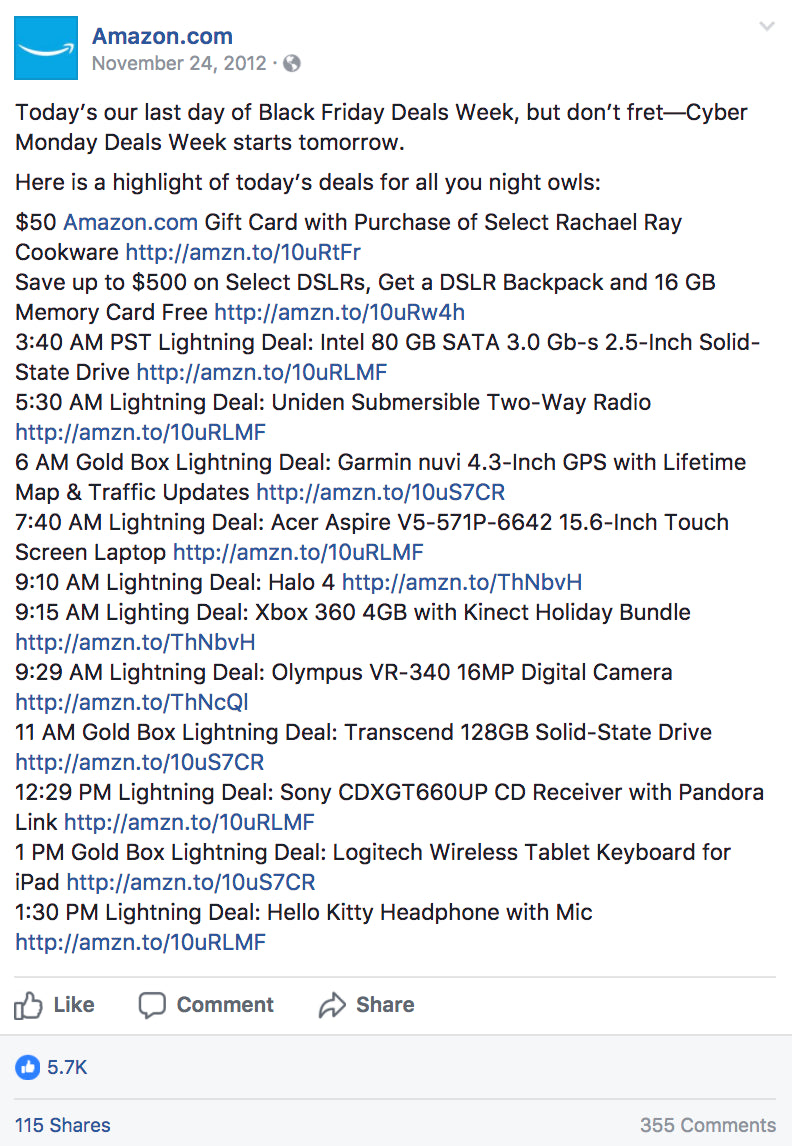
The week leading up to Black Friday, they promoted Lightning Deals. The week following Cyber Monday, they did the same. (Talk about extending the hype.)
Note that some of these aren’t just regular discounts. See those time listings? They signal the start of a Lightning Deal, which looks something like this:
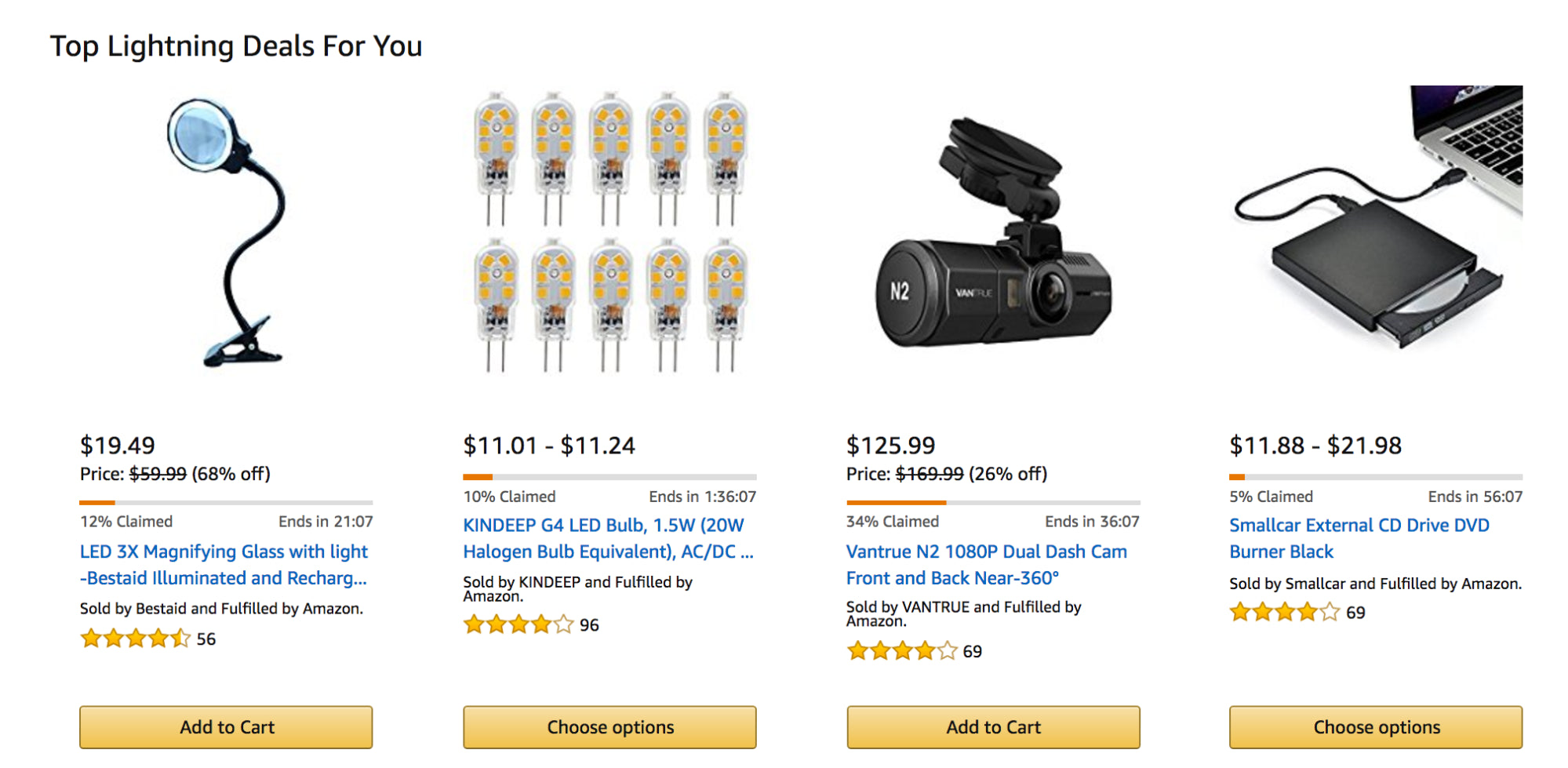
68% off, 26% off. But only for a limited time (ends in 21 minutes, ends in 36 minutes) and while supplies last (12% claimed, 34% claimed). Deep discounts, urgency and scarcity combined for maximum BFCM madness.
There are a number of apps in the Shopify App Store, like Product Discount, that can help you recreate those Lightning Deals.
Chubbies did something similar for their take on Cyber Monday, known as Thighber Monday. They decided to offer a new gift with purchase every hour for an entire 12 hours:
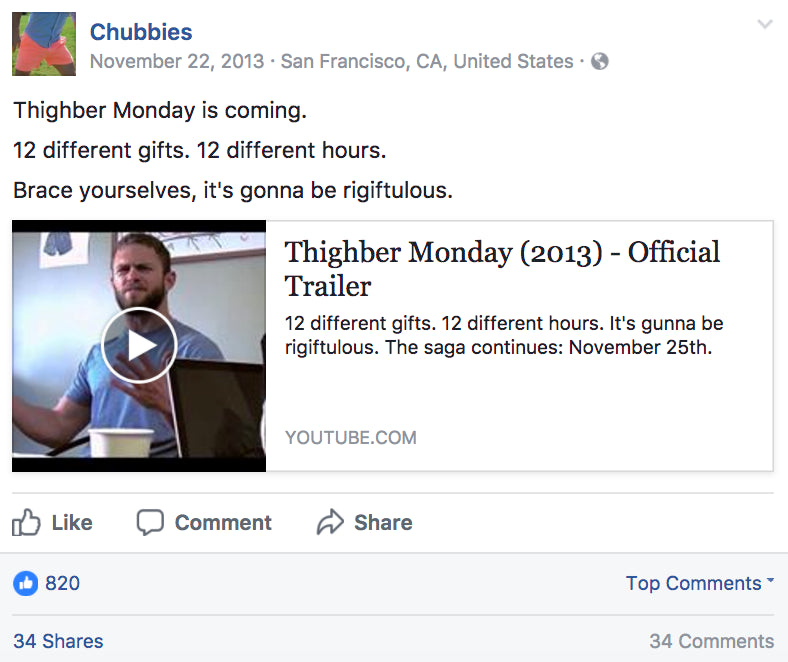
Like, really cool gifts that their customers would actually pay money for:
Not only does this create an incentive to buy, but it creates an incentive to keep checking back in with Chubbies every hour to see what the latest gift with purchase is.
2. Anti-BFCM
When you think of Black Friday Cyber Monday, tell me you don’t think of over-enthusiastic crowds trampling their neighbors in big box stores at 4 a.m. looking for the biggest TV they can fit in their car. We all know BFCM has evolved beyond that, but that negative image still comes to mind for a lot of people.
A couple years ago, REI, an outdoor clothing and gear store, decided to boycott BFCM. They suspended all retail activity, including online sales on Black Friday. On the most popular shopping day of the year? Unheard of.
They even paid more than 12,000 employees for the day off so they could enjoy the outdoors.
This now year-round campaign started as #OptOutdoors:
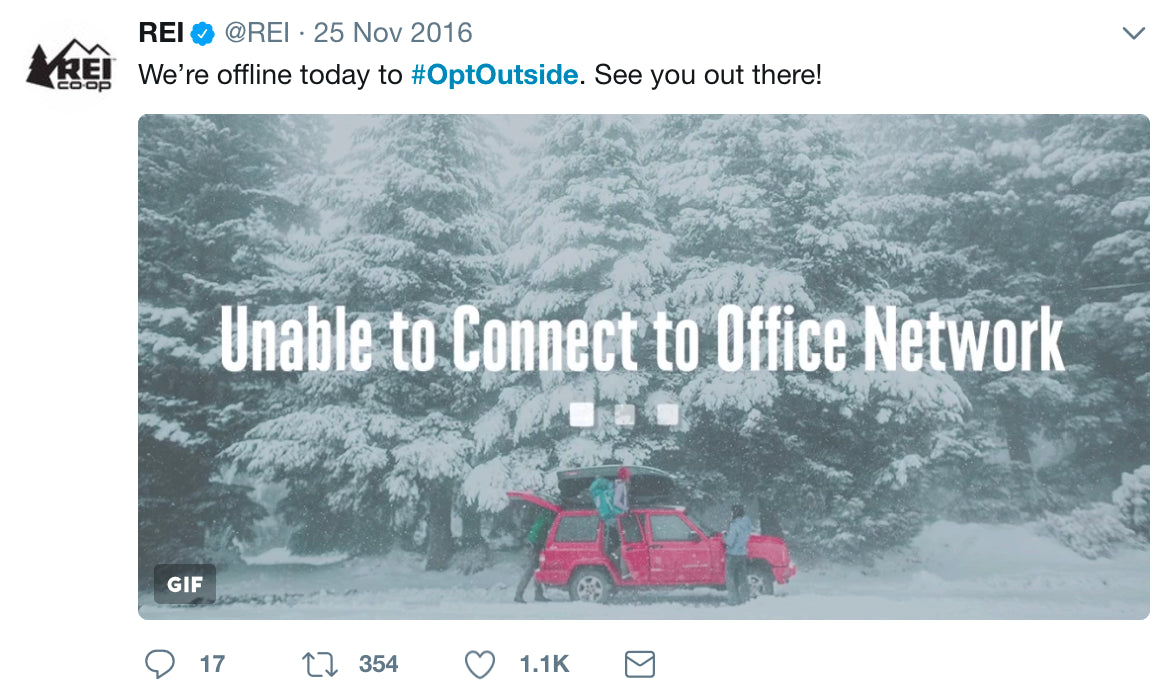
Holding true to their brand, they encouraged customers to skip the lines and get outside to explore the great outdoors.
In 2015, more than 1.4 million people participated in #OptOut. By 2016, REI had partnered with more than 275 national and local organizations, including: Google, Subaru, and Burton.
Should you boycott BFCM? Probably not. But you can put a spin on this and help reframe the perception of Black Friday and Cyber Monday. How?
Patagonia decided to donate all $10 million of their 2016 Black Friday sales to charity. Braintree donated half of their online Black Friday sales to charity as well. Fat Face ran its Thanks for Giving campaign in both 2015 and 2016, which it donates 10% of net profits over BFCM to charities local to its stores.
You get the idea. 100%, 50% and even 10% is a lot, though. Consider using even 1% of profits for the greater good this BFCM.
3. Take it live
Are you familiar with Facebook Live? According to Facebook, users watch Facebook Live videos for 3x longer than videos that aren’t live. Users also comment more than 10x more on Facebook Live videos.
There’s no denying the level of engagement and interest. Yet, it’s still relatively uncrowded. If you get Facebook Live right, you won’t have much competition.
That was what MeUndies was betting on for BFCM last year.
They organized a Facebook Live event to celebrate the sales, if you will. First, they created an actual Facebook event to invite their then 314,000 Facebook followers:
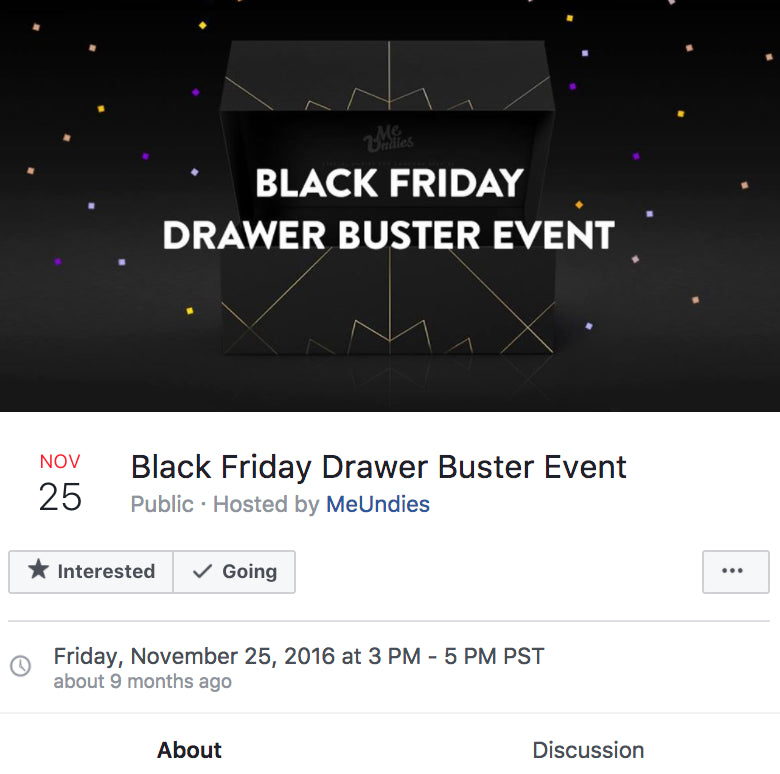
They also ran an ad campaign where they targeted customers who had opened emails from them in the past, but hadn’t made a purchase in over a year. A DJ and a dance contest (or two) drew in the crowd. As more and more people tuned in, bigger and bigger BFCM discounts were unlocked.
Who wouldn’t want to invite their friends in that case, right?
In the end, over 13,000 people tuned it, tallying just under 6,000 engagements.
Here’s the cool part. Attendees converted at a rate of 25%, 13x the average conversion rate MeUndies sees on Facebook. Not too shabby.
4. Make ‘em laugh
This sounds like a lame tip, I know. Humor has some serious conversion power, though. If you can make people laugh, their wallets open a little wider. Why? For a few reasons, actually:
- Humor attracts attention, especially on social. “Jokes work because they defy expectations. The surprise aspect of these tales kicks in the frontal lobe’s search for pattern recognition. The punchline moment shifts one’s orientation away from information processing toward an emotional response arising deep within the nucleus accumbens,” reads the Harvard Mahoney Neuroscience Institute Letter. So basically, humor is unexpected from brands and in ads, which makes it pop.
- Humor makes us forget we’re being sold to. A recent study from Radboud University Nijmegen found that humor distracts the brain, lowering its resistance to influence. We see so many ads per day that we unknowingly have our guard up, filtering out all of the ads we possibly can. Humor lowers that guard and distracts the rational brain, leading to a more emotional reaction.
- Humor puts us in a good mood. Duh, right? It’s more than that, though. A professor of marketing and statistics at Saint Vincent College found that humor elevates mood and that people may then associate their good mood with the product in question. That happiness created, that good mood becomes associated with your product or brand.
Is this an invitation to turn sharing memes into your BFCM social media strategy? No, but tastefully inserting some humor into your tweets and Facebook posts can work wonders on the persuasion side of things.
My friend Lianna Patch runs Punchline and has built her conversion copywriting career on personable, funny writing. Here are her three rules for converting with humor:
- Do your research and know your audience. Just because you’re aiming for personable and funny doesn’t mean you don’t need to conduct conversion research.
- Be heartfelt and intuitive. If you have to force humor, people will notice and it will most likely backfire. Humans like humans.
- Make your content look good. Don’t forget about design!
Stay away from top of the funnel, generically funny BFCM social media copy. Here’s how Amazon did it, for example:
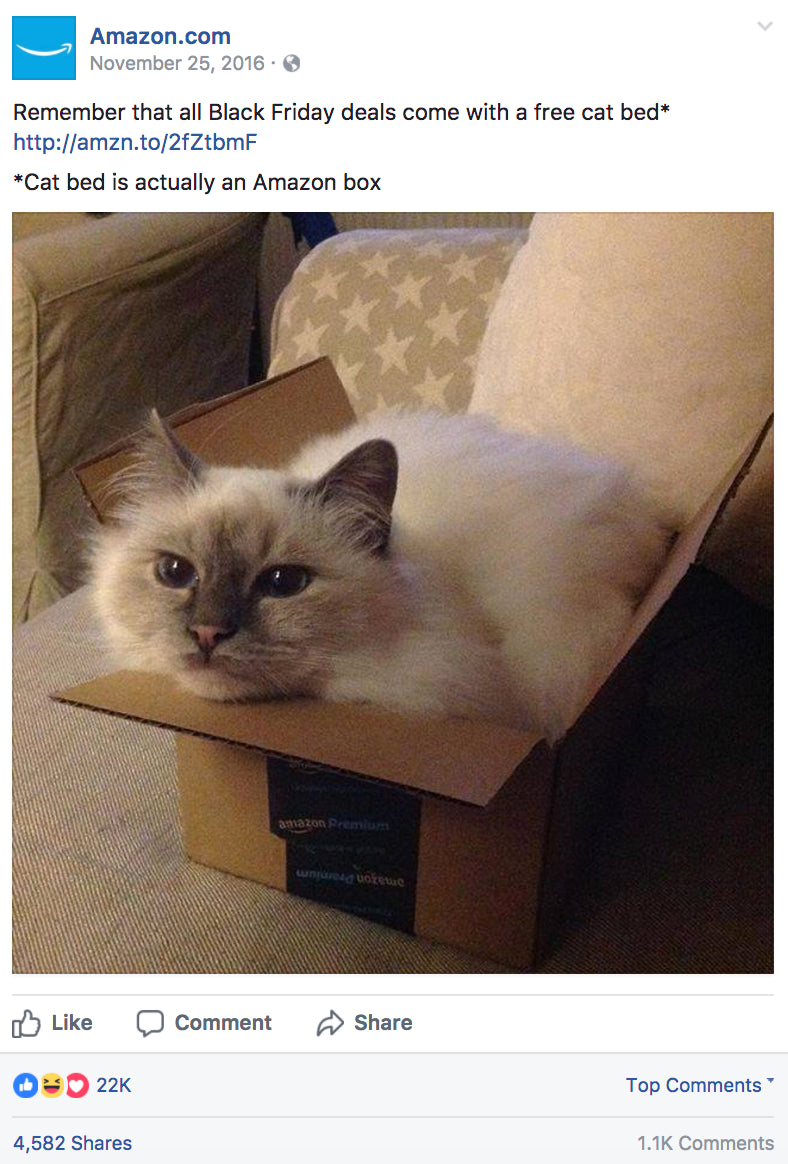
Those 1.1K comments? They look something like this:

Amazon did their research to find a passionate group within their community and sell to them using humor. That group amplified the joke by sharing pictures of their own cats in their Amazon cat beds.
The bonus? Everyone knows cats will "sits if they fits", so you don’t have to own the “crazy cat lady starter kit” Kathy talks about to get the joke.
Anyone can be funny, there’s no such thing as a boring brand. Even Denny’s knows how to get in on the BFCM social media humor game:
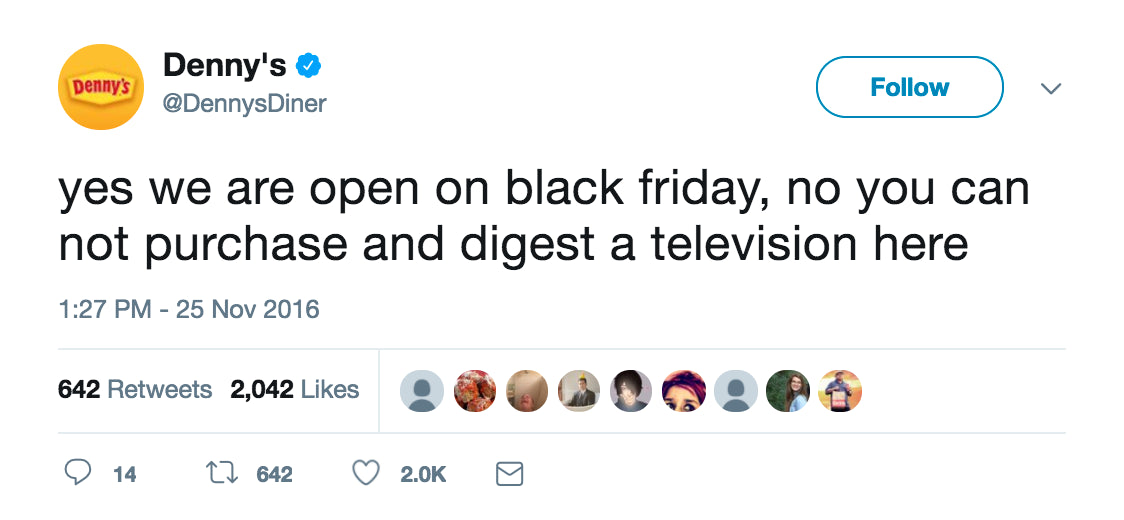
5. Put your money where your mouth is
The best way to reach a highly targeted group of people via social media this Black Friday Cyber Monday is advertising. That might be Twitter ads, Instagram ads, Facebook ads… it depends on your store and audience.
To get you in the advertising mindset, I’ll run through two simple retargeting Facebook ad campaigns you can use to squeeze more money out of BFCM this year.
First, let’s find some high-intent people to promote your deals and discounts to, shall we? Here’s how:
- Post an engaging video promoting your BFCM discount or deal (think, for example, the Chubbies videos above) on your Facebook page.
- Pay $20-50 to promote the engaging video post to your Facebook followers.
- Create a retargeting Facebook ad campaign with a traffic to site goal. Target only those who watched 50-75% of the video.
- Create a lookalike audience using that 50-75% watched segment as your basis.
- Sell, sell, sell those BFCM discounts.

Now, let’s extend the lifetime value of those BFCM seasonal shoppers with a Facebook ad campaign. This one’s really simple:
- Install a Facebook pixel on your BFCM dedicated landing pages. (This sounds hard, but it’s not, I promise.)
- Before your BFCM sales end, create a retargeting campaign based on the Facebook pixel. Target those who added something to their cart, but haven’t made a purchase. Try, for simplicity’s sake, promoting your 2-3 hottest BFCM discounts.
- After BFCM has passed, create another retargeting campaign based on the Facebook pixel. You can target those who purchased and create an ad to upsell them on a popular item. You can target those who added something to their cart, but never purchased. You can target those who just visited.
- You can also create lookalike audiences based on Facebook pixel data. This will help expand your audience even more.
![]()
Obviously, your options are limitless when it comes to paid ads, on Facebook and beyond. But if you take the time to implement even just these two retargeting campaigns for BFCM this year, you’ll be miles ahead of most competitors.
To brush up on your Facebook advertising skills before BFCM, I suggest reading our Facebook advertising guide.
Also, be sure to meet Kit. Exclusive to Shopify merchants, Kit helps you run impactful Facebook and Instagram retargeting ad campaigns. Kit is free to use and helps you take full advantage of your Facebook pixel.
Conclusion
Go beyond starting a hashtag or tweeting about your biggest sales this Black Friday Cyber Monday. Social media is ripe with opportunities around the holidays, if only you’re willing to… steal them.
Remember, you don’t need a huge social following to run impactful BFCM social media campaigns. But hey, a bigger reach won’t hurt, so start building the hype in your online communities now.
What’d I miss? Tell me about your favorite BFCM social media campaign in the comments below or ask a burning question.

